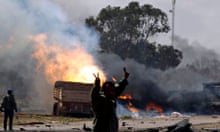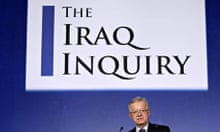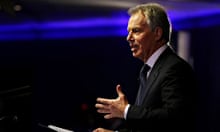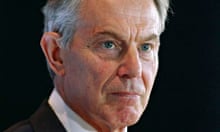Western military intervention in the Middle East has so far failed due to the distorting impact of an Islamic extremism so opposed to modernity that it could yet engender global catastrophe, Tony Blair warned on Wednesday in a keynote speech on the state of politics in the Middle East.
With support for intervention ebbing fast, especially in Britain, Blair urged a wilfully blind west to realise it must take sides and if necessary make common cause with Russia and China in the G20 to counter the Islamic extremism that lies at the root of all failures of western intervention.
He admitted there was now a desire across the west to steer clear at all costs following the bloody outcomes in Iraq, Syria, Libya and Afghanistan, but said the extremism still represents the biggest threat to global security in the 21st century, saying it is holding back development across Africa and the Far East.
In a speech to Bloomberg in London on Wednesday, the former Labour prime minister claimed the west was reluctant to look unflinchingly at Islamic extremism because the world of politics is uncomfortable talking about religion.
He said: "For the last 40 to 50 years, there has been a steady stream of funding, proselytising, organising and promulgating coming out of the Middle East, pushing views of religion that are narrow minded and dangerous. Unfortunately we seem blind to the enormous global impact such teaching has had and is having.
"Within the Middle East itself, the result has been horrible, with people often facing a choice between authoritarian government that is at least religiously tolerant; and the risk that in throwing off the government they don't like, they end up with a religiously intolerant quasi-theocracy."
Insisting that the west had to take sides, he described Islamic extremism as "not about a competing view of how society or politics should be governed within a common space where you accept other views are equally valid. It is exclusivist in nature. The ultimate goal is not a society which someone else can change after winning an election. It is a society of a fixed polity, governed by religious doctrines that are not changeable but which are, of their essence, unchangeable."
The region's chaos was not a battle between Sunni or Shia, or primarily due to the lack of economic opportunity, but due to "a common struggle around the issue of the rightful place of religion, and in particular Islam, in politics".
He argued: "There is a Titanic struggle going on within the region between those who want the region to embrace the modern world – politically, socially and economically – and those who instead want to create a politics of religious difference and exclusivity. This is the battle. This is the distorting feature. This is what makes intervention so fraught but non-intervention equally so. This is what complicates the process of political evolution. This is what makes it so hard for democracy to take root."
An inability to understand the common cause of the failure of western intervention leads to the west being baffled by the apparent failure of regime change in Afghanistan and Iraq, he said, although he added that people may come to view the impact of those engagements differently with time, even if at present there is no appetite to do so.
He also admitted Libya was a mess, destabilising neighbouring countries, and described Syria as such an unmitigated disaster that it may now be better to come to a repugnant interim deal that leaves its president, Bashar al-Assad, in power.
But his condemnation of western foreign policy in Syria is complete, saying: "We call for the regime to change in Syria, we encourage the opposition to rise up, but then when Iran activates Hezbollah on the side of Assad, we refrain even from air intervention to give the opposition a chance. The result is a country in disintegration, millions displaced, a death toll approximating that of Iraq, with no end in sight and huge risks to regional stability."
He suggested the west should once again consider no-fly zones, subject to the opposition groups not receiving support from Iran.
Aware he is an increasingly lonely advocate of intervention, he said: "I completely understand why our people feel they have done enough, more than enough. And when they read of those we have tried to help spurning our help, criticising us, even trying to kill us, they're entitled to feel aggrieved and to say: we're out."
But in an impassioned call not to see the Middle East as a battle between two evils he said: "The important point for western opinion is that this is a struggle with two sides. So when we look at the Middle East and beyond it to Pakistan or Iran and elsewhere, it isn't just a vast unfathomable mess with no end in sight and no one worthy of our support. It is in fact a struggle in which our own strategic interests are intimately involved; where there are indeed people we should support and who, ironically, are probably in the majority if only that majority were mobilised, organised and helped.
"But what is absolutely necessary is that we first liberate ourselves from our own attitude. We have to take sides. We have to stop treating each country on the basis of whatever seems to make for the easiest life for us at any one time. We have to have an approach to the region that is coherent and sees it as a whole. And above all, we have to commit. We have to engage"
Blair caused controversy when he sided with the Egyptian military's overthrow of the democratically elected government of the Muslim Brotherhood, and his intervention in Iraq in 2003 has been cited as one reason why the west has refused to intervene more in the three-year Syrian war.
Blair warned: "The threat of this radical Islam is not abating. It is growing. It is spreading across the world. It is destabilising communities and even nations. It is undermining the possibility of peaceful co-existence in an era of globalisation. And in the face of this threat we seem curiously reluctant to acknowledge it and powerless to counter it effectively."
In a clear reference to Saudi Arabia, he said: "It is absurd to spend billions of dollars on security arrangements and on defence to protect ourselves against the consequences of an ideology that is being advocated in the formal and informal school systems and in civic institutions of the very countries with whom we have intimate security and defence relationships."
He claimed some of these countries wanted to break out of this ideology, but needed the west to make it a core part of the international dialogue in order to force the necessary change within their own societies.










Comments (…)
Sign in or create your Guardian account to join the discussion